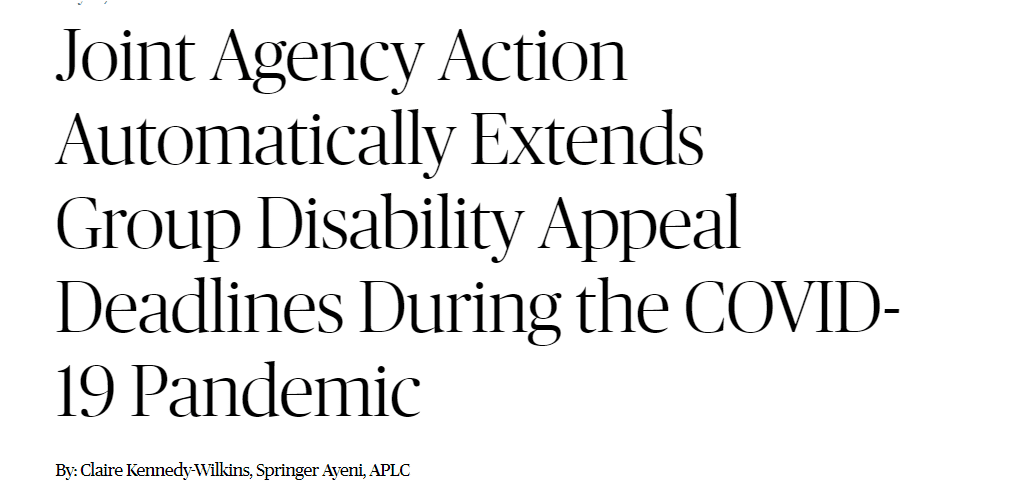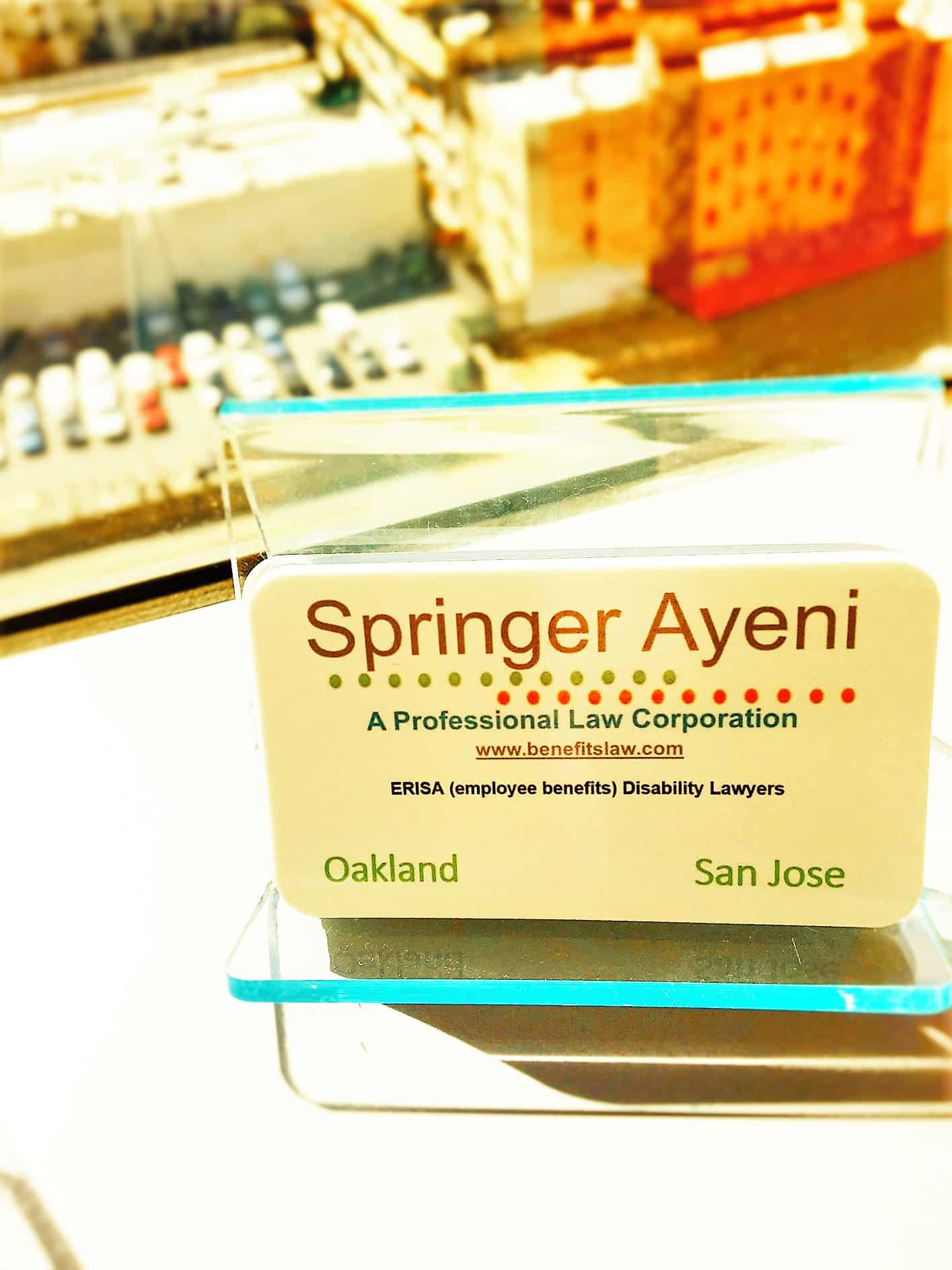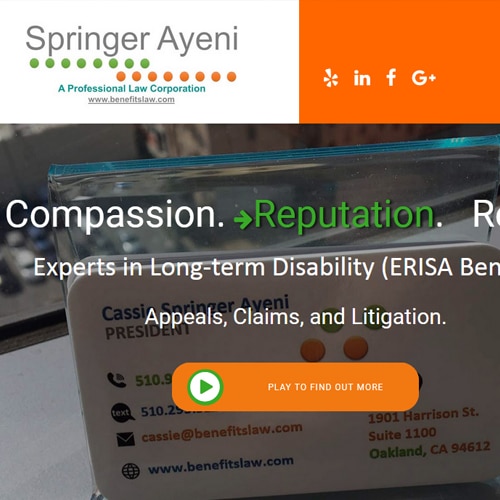
Joint Agency Rule Extend Disability Appeal Deadline in COVID
Congratulations to my co-worker, Claire Kennedy-Wilkins for her thoughtful and insightful article
“Joint Agency Action Automatically Extends Group Disability Appeal Deadlines
During the COVID-19 Pandemic.” In these times, it is great to know that EBSA
and DOL are aware of the added burden on disability plan participants to gather
information for appeals of denied claims and have acted in the interest of
these participants.
#Coviddisability#ABA#erisalawyer#erisabayarea#ERISA#springerayeni#disabilityappeals
https://www.americanbar.org/groups/labor_law/publications/ebc_news_archive/issue-spring-2020/joint-agency-action/
ERISA Basics National Institute 6-Part Webinar Series
June 15th – 17th 2020, I will be speaking on two Employee Benefits Claims panels at the American Bar Association Joint Committee on Employee Benefits sponsored – ERISA Basics National Institute 6-Part Webinar Series. On the panels, I will present: 1) Statutory Overview and 2) Benefit Claims: Administrative Procedures & Litigation. The great news is that – it is virtual! Now you can join in without the burden of travel! #silverlinings. I look forward to the discussions, questions, and sharing of insights/ideas.
For more, see event details: https://www.americanbar.org/events-cle/mtg/web/394126606/
Or contact: Cassie Springer Ayeni, President of Springer Ayeni, A Professional Law Corporation @ www.benefitslaw.com
#JCEB #EBC #ABA #ERISA #Employeedisabilitybenefits #disablity #ERISAlawyer #Superlawyer #Disabilityclaims #Disabilityappeals #Longtermdisability #ERISAlitigator #ERISAbayarea #Disabilitylawyer #Employeebenefitslawyer #ERISAlawfirm #SpringerAyeni #benefitslaw #presenter

Cassie Springer Ayeni Named SuperLawyer 6 Years in a Row
For the 6th consecutive year, Cassie Springer Ayeni has been named a SuperLawyers Top 50 Women Attorney for Northern California, and a Top 100 Attorney for the 5th consecutive year. She has been named to the SuperLawyers list for her expertise in employee benefits for 8 consecutive years.
Read More
Here’s a blast from the near past, which feels like a lifetime ago
So much has happened in these few months since I wrote this message to the Employee Benefits Committee as one of its incoming co-chairs. Since then, we had a successful midwinter meeting in Rancho Mirage, but none of us knew that would likely be our last travel occasion for the foreseeable future. Here’s a blast from the near past, which feels like a lifetime ago:
Read More
Springer Ayeni Wins Disability Case Against Aetna
Even in tough times, we are grateful for the hard-working judges and court personnel who continue to decide cases and keep the wheels of justice turning. On March 24, 2020, the attorneys at Springer Ayeni achieved a victory for our client, a man disabled by shoulder pain and denied disability benefits by Aetna Life Insurance Company. Judge Chesney of the Northern District of California ordered benefits paid for Mr. Shaikh’s own occupation and remanded for a determination on the amount. The Court found that Aetna “overly focused” on objective medical evidence and “essentially disregarded” Mr. Shaikh’s credible complaints of pain. Springer Ayeni is now pursuing attorney fees against Aetna. https://law.justia.com/cases/federal/district-courts/california/candce/3:2018cv04394/329565/46/
Read More
A Conversation with Attorney Cassie Springer Ayeni
Q: When did you know you would pursue a career in the legal field?
CSA: As early as junior high or high school, I felt the need to advocate for others, to make a point to stand up for the kids who were being bullied or ostracized. I also realized around the same time that I truly enjoyed writing, reasoning, and debating. The law seemed a natural fit: I could use my skills to make a palpable difference in people’s lives. I had settled on a career in law by the time I was 16 and never looked back.
Q: Can you explain what types of cases an ERISA Attorney handles and why you chose this area of law?
CSA: I primarily help people with their employer-sponsored disability benefit claims. ERISA governs all private employer benefit plans, not just pension plans. Many employers provide disability benefit plans in addition to health and pension benefits. In fact, 65% of ERISA litigation is over denied disability benefit claims. The plans are often insured, and clients typically come to me after they stop working, apply for disability benefits to the insurance company, and are denied. I then step in to try to get their disability benefit income restored while they focus on their health.
Q: What is your approach or philosophy to winning or representing a case?
CSA: I lead with kindness. I want to understand truly what my clients have gone through medically, economically, and emotionally to get to this point in their lives, and how I can help. In representing a client, I am there for that person: I am responsive and listen with an open heart. I believe this the secret to winning a case as well – if I am doing my job right, I am painting a picture of the person and the case to help the court appreciate why my client is deserving of their disability benefits. I have the paintbrush and paint ready because I have spent months getting to know my clients and researching the law. And I also aim to be the best-prepared lawyer in the room with the most compelling brief … that helps too.
Q: If we interviewed all your past clients … what is “one” common word that comes up when they describe working with your law firm?
CSA: Compassion
Q: What are some of the most popular topics you are asked to lecture on?
CSA: I speak frequently on ERISA topics, especially in my current role as the co-chair of the ABA’s Employee Benefits Committee. I love presenting to newer attorneys about the fundamentals of ERISA litigation, because I am eager to energize attorneys about how engaging ERISA work is. ERISA is fun! The law is always evolving, providing constant intellectual stimulation, and practicing ERISA law is also a great way to help people in need. I also enjoy speaking to women about re-defining what it means to be a successful litigator, and how to challenge traditional law firm standards to achieve a better work-life balance.
Q: What advice would you give to young women who want to pursue a career as an Attorney?
CSA: Any woman who wants to pursue a career as an attorney should make sure that her potential work environment values diversity and inclusion, fosters a sense of belonging, and creates opportunities for women at every turn. If she is unable to find that environment, she should open her own law firm and create those opportunities herself.
Q: How do you maintain a work/life balance?
CSA: Being the owner of my firm allows me to make up the rules: I look to the best practices of progressive companies and pick policies that I believe are imperative to work/life balance for everyone. I figure that everything I need to raise four children and work full-time as an attorney is what everyone at my firm needs too. I offer unlimited PTO, great benefits, four months of fully paid maternity leave, the ability to bring children in to work as needed (in fact I have brought each of my babies into work until they needed another environment), the ability to work from home, and a practical approach to parenting … like closing the office on Halloween and Valentine’s Day so that we can all attend class parties without rushing to or from work. I, of course, avail myself of each of these policies, which is why I created them in the first place. That’s not to say that I don’t wake up early to work for a bit so that I can focus fully on my kids to take them to school, or grab a few hours on the weekend to pound out a brief, but family always comes first, for me and for everyone who works at Springer Ayeni.
Q: What’s one lesson you’ve learned in your career that you can share with our audience?
CSA: I have always learned to be myself. If you are authentic, you are compelling as an advocate and a counselor: you listen and communicate better when you are not spending energy on worrying about how you should come across. I also believe in the power of preparation. If you are committed to doing your best and preparing your utmost, then even a negative outcome cannot be met with regret, but a positive outcome is much more likely. And if you’re nervous before a court appearance or speaking engagement, just take a breath and realize that even in a worst-case scenario, you will survive and move forward … we all do.
Q: What are some of the challenges you feel women face today?
CSA: Looking at women lawyers only, there is much progress to be made. As Joan Williams at the UC Hastings Center for WorkLife Law has analyzed convincingly, women lawyers (and women in other fields too) are asked to “prove it,” then “prove it again.” In other words, women need to do the job before getting the promotion, whereas men are promoted based on potential. This is a major obstacle to women’s promotion and needs to be addressed systematically.
Five Things About Cassie Springer Ayeni
1. If you could talk to one famous person past or present, who would it be and why?
There are so many! But if I had to pick one it would be Harriet Tubman – her courage and vision even in the face of medical problems were and are awe-inspiring.
2. What’s your favorite holiday? Why?
Valentine’s Day! I don’t view it as just a romantic holiday, but as a day to express to those around you how much you care.
3. If you were a superhero, what would your special powers be?
Time-traveling. That would be magical!
4. What app can’t you live without?
Facebook – it has allowed me to make great connections with other lawyer moms – lawmas!
5. Favorite food to eat?
Strawberries. Now, then, forever, and always.
See the interview at https://bayareawomenmag.com/news/view/11665/Her_Firms_Achievements_-_Results_are_Measured_by_the_Satisfaction_of_Her_Clients_A_Conversation_with_Attorney_Cassie_Springer_Ayeni
Read More10 Questions to Ask a Disability Lawyer Before You Sign

Let’s face it: it’s daunting to hire an attorney. There are thousands of lawyer jokes for a good reason. But sometimes in life you need a good advocate in a legal proceeding, or just someone to give advice before the going gets rough. Hiring an attorney requires careful consideration of not just the finances of the relationship, but also a determination of whether she will be a good fit for one of the most significant professional relationships you will likely have. These questions will help you avoid making mistakes when choosing an attorney who suits your style.
Q1. Can you give me a cost estimate?
Attorneys will not be offended by this question. We know it’s pricey to hire a lawyer and you need to plan for it. A good attorney will offer a variety of options to work with your budget and risk tolerance. If an attorney offers to work on a “contingency fee,” that means she will work unpaid until securing money on your behalf, and then her fee will be a percentage of that award. Typical attorney contingency fees range from 33-40%. If an attorney offers an hourly rate, be sure to ask if other attorneys in the office can do some of the work at a lower rate, and if administrative tasks can be handled by paralegals or legal secretaries, as this might be a way to reduce the monthly bill. Also ask if the attorney bills in .1 hour or .25 hour increments and if she bills for small emails or voicemail exchanges. Some attorneys may offer a “flat fee,” or you could suggest that option yourself. Many clients like the certainty of a financial cap: but beware the unethical attorney who would accept that amount of money then work as little as possible. You need to trust the attorney you hire before agreeing to any of these arrangements, but especially the flat fee. If you get a “shark vibe,” look in another direction. Also, if you have a creative idea, feel free to propose it! At the very least, it will give you an idea of how open-minded your future attorney might be.
Q2. Can you tell me how you would approach my case?
Most attorneys tread very carefully about giving legal advice without a retainer agreement in place, as they do not want to create an attorney-client relationship where there really is not one. A good attorney will listen to your problems, describe how she might handle your case, and may give some general information or direct you to a resource, but steer clear of an attorney who is over-eager to breach ethical constraints by doling out free advice just to nab you as a client.
Q3. How do you handle these types of cases?
An experienced attorney should have an easy answer to this question. For example, as an ERISA attorney, I am clear about what needs to happen to maximize the chance of a successful outcome when, for example, appealing a denied disability benefit claim. If it was my first rodeo, I wouldn’t have a firm plan of action. Look for a thorough and confident answer to this question.
Q4. Have you ever handled a case with facts similar to mine?
In my area of the law, I interact with people who have myriad ailments causing their disabilities. My clients feel comfortable off the bat if they know I am at least familiar with their medical conditions, and you probably will too.
Q5. How accessible are you?
Some attorneys specialize in reeling in clients and then disappearing. Make sure your attorney will be involved in your case from start to finish, even if she doles out assignments to others in her law firm. Just like most professions, attorney skills and personalities vary widely, so make sure that you are getting what you’ve paid for. Which leads me to…Question 6:
Q6. What are your past results in cases at the same stage as mine?
No attorney could possibly guarantee an outcome in your case – there are too many variables. But an attorney should definitely be able to describe similar cases she has handled and what the outcome has been.
Q7. Will attorneys or paralegals do most of the work in my case?
A law firm that has a paralegal doing attorney work (writing substantive letters, making strategy decisions on cases, etc.), is very different from a law firm where the attorneys do all of the attorney work. Be sure you know who will be working on your case and their credentials.
Q8. What are you most proud of in your career? In your personal life?
Get a sense for the attorney’s values by asking her to describe a case that has meant something to her. You’ll understand a lot about her style and substance by hearing her describe a proud moment. If she’s willing to discuss a proud personal moment, that could be a great opportunity for you to see who she really is. I figure that clients have to entrust a lot of sensitive information to me about their lives, so I definitely don’t mind sharing now and again about my own if asked. It’s the least I can do to bond with my client on a human level.
Q9. At what stage do you get a positive outcome for most of your clients?
Some attorneys like to get to court as quickly as possible. Some attorneys like to try to secure a victory at an earlier stage for their clients. If you are a “rush to court” person, you should find an attorney with a similar mindset. If you prefer an attorney who tries to get a positive outcome sooner, even without having to file a lawsuit, you should hire an attorney who shares a similar point of view.
Q10. How involved do I have to be?
My style is to include the client if she wants, but my preference is to just let her sit back, relax, and let me handle the nitty gritty details of her case without stressing her. Some attorneys may want more client involvement, particularly if they can get a client to do some of the legwork. Figure out how much involvement is comfortable for you, and make sure your potential attorney is a good match for your comfort-level.
Above all, make sure that you like your potential attorney. You will talk with her for hours, email frequently, and she will know more about you than many others in your life might. If you like her, feel like she understands you as a human being, and that she will work tirelessly for you, then it’s a match. And, of course, if you want to talk to me about a disability benefit application, appeal, or lawsuit, feel free to call and ask me any of these questions!
Read MoreERISA Disability Benefits At Work
Thanks to CNN for covering such an important story. I’m proud to represent this brave and amazing woman, Erika Zak. She was approved for her liver transplant at the last minute, but I was poised to file a complaint in the coming days if UHC had not finally done the right thing. Still, I wish it had reached this decision months ago. I hope she can now get the transplant as quickly as possible so that she will celebrate many more Mother’s Days to come. #livertransplant #ERISA #mothersday #Springerayeni #benefitslaw
https://www-m.cnn.com/2018/05/13/health/liver-transplant-mom-erika-zak/index.html
Read More
Long Term Disability (LTD): The Hidden Gem in Your Benefits Package

What is an LTD benefit?
Most long-term disability benefits are insurance policies that provide about 50-67% of your base income should you become disabled. What does it mean to be disabled? It will be defined in the policy, but typically it is defined as the inability to perform the material duties of your occupation due to illness or injury. After some time, usually 24 months, the definition of “disability” may change to the inability to perform the material duties of any occupation (taking into account your education, training, and prior income level) due to illness or injury. Mental illness disabilities are usually limited to 24 months of benefits in total.
Many illnesses or injuries can qualify you for a disability benefit. Examples include back, neck, knee, or upper extremity pain, migraines, fibromyalgia, cancer and its consequences, HIV/AIDS, pulmonary dysfunction, cognitive impairment, neurological conditions like Parkinson’s Disease, or chronic pain conditions. Disabilities do not just strike the elderly; my clients range from ages 29-67, with most of them being in their 50s. Yet they all have one thing in common: none were expecting to have to stop working before retirement age due to a medical problem.
Who has an LTD benefit plan?
Most professionals work for employers that provide disability benefit plans. These disability insurance policies have relatively low premiums, so employers often provide disability insurance to their employees as a matter of course. If you work for an employer that provides professional, medical, or technology services you are a prime example of someone who probably has a disability benefit plan through your employer. For example, I frequently represent doctors, nurses, and other medical professionals, lawyers, engineers, project managers, programmers, financial services professionals, executive directors, and even insurance claims adjusters. To see if you have disability coverage, look up your original benefits package or examine what benefits you elected. You can also look up your employer’s IRS Form 5500 filing, which should include details on ERISA retirement and “welfare” benefits such as health, disability, and life insurance benefit plans. ERISA is the law that governs almost all employer-sponsored benefits.
What to do if you need to apply for LTD benefits?
If your doctor has advised you to stop working, please verify whether your employer has an LTD plan or give me a call and I’ll help you figure it out. There are other benefits that might be available to you as well (state disability, Social Security, workers’ compensation, etc.), which I can outline for you. If your employer does have an LTD plan, bear in mind that the reason you stop working has to be because of your disability for you to have coverage and make a successful LTD claim. In some states, including California, late applications can still be accepted as long as the insurer is not harmed by your late claim notice. Typically, your last date of work is also your first date of disability. If you are laid off for performance reasons that are actually related to your disability, you may still have a good LTD claim, but call me to help you analyze it. (You may also have a disability discrimination claim.) If you 1) have an employer-sponsored LTD plan, 2) need to stop working because of a medical condition, and 3) your doctor has advised you to stop working and will fill out a form on your behalf, you should strongly consider applying for LTD benefits. These benefits may be available until age 65 or 67, so do not shy away from making an application! However, there are many traps along the road of applying for and receiving LTD insurance benefits, so feel free to reach out to me if you have any questions about whether you should apply or how to maximize your chances of receiving benefits.

#LTD benefits
My Patient Needs to Stop Work … Now What?
By Cassie Springer Ayeni, Disability and Life Insurance Benefits Lawyer
with Springer Ayeni, A Professional Law Corporation
cassie@benefitslaw.com . www.benefitslaw.com
It happens: your patient comes to an appointment, and after months or years of “getting by” at work, despite a degenerative or chronic condition, it is clear to you that those days are over. You recommend that for her health, she stop working. Now what?
What your patient now faces is a host of forms and requests from insurance companies and the government to ensure that she has some income even though she’s not working anymore. Besides savings (and it is unheard of for someone in the prime of her working life to have sufficient savings to live decently for the rest of her days), income sources for people with disabilities include:
- Employee benefit plans (short-term disability then long-term disability). Long-term disability usually starts after 6 months and can last until retirement age.
- Private disability insurance plans (also lasting until retirement age).
- State disability insurance that usually last for a year (like California’s EDD).
- Social Security Disability Benefits (available after being disabled for a year and lasting through retirement age).
To qualify for any of these benefits, the #1 thing that a patient needs is help and support from the doctor. Without it, she won’t be approved; and if support wanes in the future, the insurance companies won’t hesitate to cut off her benefits. Here’s what you can do to help ensure that your patient receives disability benefit income on time and without hiccups:
Medical Records
- Document the reason why the patient is disabled in the medical records. List as many objective findings as are available (ROM, atrophy, MRIs, visual findings, etc.), including your objective observations.
- Document in the medical records whether the patient’s complaints of pain, fatigue, or other disabling symptoms are credible.
- If the patient has worked with the condition, answer the question in the medical records of “why now?” Why was she able to work before with the condition but suddenly cannot? Has there been a worsening of symptoms? Do you feel that her best chance of getting better is by resting for a bit at home? Document your rationale in the medical records.
- When the patient gets approved for benefits, keep track of the symptoms in regularly scheduled check-ups; insurance companies request updated medical records every 6-12 months.
Forms Requests
- Be sure to complete and return forms as quickly as possible. Although it is tempting to punt the form-filling to a secretary, it is more credible when completed by you.
- If there are any boxes on the forms that not applicable to your patient, just write N/A or rephrase the question so it makes sense for your patient
- Beware of traps in the questions: If a question states “how often can your patient work? 3 hours, 6, hours, or 8 hours a day,” but you feel your patient could only work 1 hour a day with breaks and unreliable, don’t check a box; just write your true response.
Working with the Lawyers
- Thankfully, with the increasing popularity of medical-legal alliances, most physicians and lawyers now truly comprehend their shared interest in the patient’s well-being, and working together on the insurance requests helps for seamless communications with the insurer. A patient about to go on disability can benefit from a quick call to a benefits attorney to make sure that every “I” is dotted and “t” is crossed.
- A patient whose disability benefits claim has been denied should never attempt to appeal on her own without the benefit of some legal advice.
- Also, even when a patient is approved for benefits, don’t hesitate to ask her lawyer for help understanding the forms; the lawyer and the patient will appreciate it more than you know.
Cassie Springer Ayeni is the President and Founder of Springer Ayeni, A Professional Law Corporation, in Oakland, CA, where she focuses on ERISA disability and life insurance cases. She can be reached atcassie@benefitslaw.com or www.benefitslaw.com
Read More





